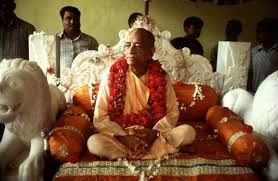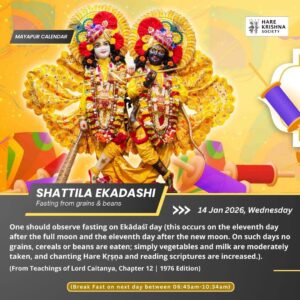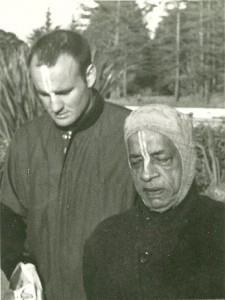Hare Krsna to all
Pranams
All glories to Srila Prabhupada
This book, Sri Chaitanya -Siksamrta is simply wonderful in that it contains so much pertinent information regarding the souls release from Maya in our conditional state. Here below is one short example contained in the sixth rainfall chapter.
But first, from Srila Prabhupadas books we have the 2 verses given by Srila Rupa Goswami in Nectar of Devotion which give in summary the progressive stages one will encounter on the road to Love of God, or Krsna Prema.
adau sraddha tatah sadhu-ango ‘tha bhajana-kriyatato ‘nartha-nivrttih syattato nistha rucis tatahathasaktis tato bhavastatah premabhyudancatisadhakanam ayam premnahpradurbhave bhavet kramah
“In the beginning one must have a preliminary desire for self-realization. This will bring one to the stage of trying to associate with persons who are spiritually elevated. In the next stage one becomes initiated by an elevated spiritual master, and under his instruction the neophyte devotee begins the process of devotional service. By execution of devotional service under the guidance of the spiritual master, one becomes free from all material attachment, attains steadiness in self-realization, and acquires a taste for hearing about the Absolute Personality of Godhead, Sri Krsna. This taste leads one further forward to attachment for Krsna consciousness,
which is matured in bhava, or the preliminary stage of transcendental love of God. Real love for God is called prema, the highest perfectional stage of life.” In the prema stage there is constant engagement in the transcendental loving service of the Lord.
——————————
Now here is what Srila Bhaktivinode Thakur writes on the same topic.
(please forgive any typos)
Upon examining the lives of devotees, it will be found that some have developed faith by studying the scriptures impartially. Many have developed faith by association with devotees and hearing their teachings. Others have developed faith in bhakti after performing duties according to varnashram and developing repulsion for taking material results from such activities. Others have developed faith through disgust for speculative knowledge. Others have developed faith suddenly.
There is no specific rule for the develolpment of faith, for faith , the seed of the creeper of bhakti is above the rules. Therefore, it may be said that faith develops only within the consciousness of a fortunate soul.
The end of executing karma according to ones varnashrama duties and the appearance of faith are simultaneous. When faith arises, the devotees become filled with hopeful anxiety. This sraddha (faith) is the first stage in the development of prema.
By previous material habits, the aspiring devotees are still controlled by sinful tendencies, but thinking of how to dissipate this evil, they take shelter at the feet of pure devotees. The aspirants begin to search out pure devotees free from material desires, and by Krsna’s mercy, they attain such association. This sadhu -sanga (association with devotees) is the second sign in the development of prema.
In that pure association, the devotees begin to carry out devotional activities, such as hearing and singing the glories of the Lord and remembering the form, qualities and pastimes of the Lord. With this practice, of bhakti, according to the five divisions mentioned previously, material sense pleasure and desire, which are the root of the material evils, become submissive to bhakti. Although the tendency to sinful activity remains within the body, the desire, the desire to sin is now given up. This is the third stage in attaining prema known as bhajana kriya (devotional action).
By cultivating devotion, attachment to material pleasure, sinful conduct, violence, greed and other material habits gradually decreases, and the devotee becomes progressively free of material desire. This is
anartha nivrtti (clearing of sin) the fourth stage.
When material desire dissipates , attachments to things other than the Lord also disappears. Faith becomes nistha (steadiness) in devotion to the Lord. As long as the anarthas remain, faith cannot be steadily applied to the Lord, so to the extent that the anarthas are extinguished, faith turns into nistha. This attainment of nistha is the fifth stage in attaining prema.
Attaining steadiness, devotees perform their devotional activities and take association with more care. By this the anarthas are further reduced and steadiness turns to joy in the Lords service. This is called ruci (taste). This is the sixth step. With ruci for Krsna is well established, everything else material becomes tastless.
When ruci becomes intense, along with greater destruction of sin, askati (attachment) appears. Asakti is still within the purview of sadhana bhakti. However, sadhana has now become perfect, devotional attachment has reached fullness, and the devotee feels successful. This askati is the seventh stage.
When asakti becomes completely full and deep it is called bhava,(ecstasy) or rati (the seedling of prema). At the stage of asakti, there is no manifestation of suddha sattva svarupa. This is attained at the stage of bhava, and so the heart melts becoming soft and smooth. This bhava is the eighth stage
When bhava attains exclusive possessiveness of Krsna, it is called prema, which is the state of permanent spiritual emotion suitable for rasa. This the ninth stage in devotional development.
The devotees performing sadhana bhakti should always be attentive to the condition of their devotion, perceiving the condition yesterday and that improvement made today. If they perceive that after some time no progress has been made according to the stages given above, they must understand that some offence must have been committed. Having diagnosed that offence, they should give it up and by association with devotees correct the harm done. Continuously cultivating bhakti and praying to Krsna , they should be careful that the offence does not occur again.
Those who do not care to examine their progress will advance very slowly because of unseen obstacles they have created. Devotees please take special precaution of this matter.



